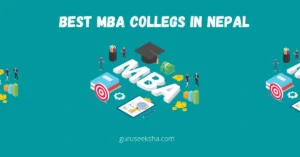At the end of each year, SEE – Secondary Education Examination is taken by grade 10th students. This examination is given huge importance in Nepalese society from the beginning. What to study after SEE in Nepal? Where to study?
What is best for me? Will I get the job after studying a particular subject? What is the scope of different faculties? These are the most common questions among the students who just have stepped out of school premises.
Many students are in a dilemma as there are a plethora of options available in the market after SEE.
Along with growing technological development, the world is moving fast. The need for skilled manpower is more than ever before.
By analyzing the market and its need along with students’ interests we have tried to solve students’ confusion on what to study after SEE in the best possible way.
Today in this article we are trying to question all your queries regarding this subject matter so that you can have a clear vision of what to choose at the end of this article.
Best ways to make decisions for choosing a particular subject
1. Understand your interests
This is the most important point on what to study after SEE which shouldn’t be missed out on for making a decision on what to study after SEE. Otherwise, things will get messed up a hundred percent. Sit down for a while and try to understand your perspective on the study.
You can note down on a copy everything that comes up in your mind. Don’t try to be perfect rather just follow your intuition.
Here are a few things that are to be thought of:
a) Analyze your strengths and weakness. What are subjects that you are good at? Which are the subjects that you find difficulty with? What are the subjects you can be good at in the future?
b) What’s your nature whether you’re technically good at maths or science or creative and theoretical subjects like Social studies, Nepali, English, or Business?
c) Most importantly note down the subjects that you can pass comfortably.
2. Avoid social pressure
Nowadays, most of the students get good marks in SEE although many of them are just average.
Private schools give huge priority to SEE as a result they put extra pressure on students along with making students attend extra tuition classes.
Due to all these and other factors, many students are able to perform well in SEE exams. Thus many parents tend to influence their children’s decision-making in spite of guiding them as per their capacity.
Without understanding their children’s capacity many parents force them to take the science stream. Because they have got good grades at the school level.
Furthermore, many students study science as their best friend is also studying science. Don’t do such a blunder.
At the end of the day, it is you who have to study and pass the exam. In that situation, none of your parents and friends are going to help you. Thus don’t put yourself into such a trap rather take your decision by your guts.
3. Understand the Scope of Each Stream
Many students might not know what stream to take to find the carrier path of their desires. Understand in which field you can go after studying a particular subject.
Analyzing each faculty will give clarity for further study. Thus analyzing the scope of each stream becomes an important factor to be considered regarding what to study after SEE.
Plus two education is of two years duration and exams are taken by NEB(National Examination Board).
Here is a brief description of the scope plus two streams:
a) Science
In the science stream, there are mainly two subdivisions
- Physical Group: Consists of Maths, Computer, Physics, Chemistry, and English in eleventh grade. While including Maths, Nepali, Physics, Chemistry, and English in twelfth grade.
2. Biology Group: Consists of Maths, Biology, Physics, Chemistry, and English in eleventh grade. While including Nepali, Physics, Chemistry, Biology, and English in twelfth grade. They also have an option for extra maths in twelfth grade in case they want to go into the Engineering field afterward.
If you have planned to study medicine, engineering, Agriculture, and Forestry, BSc(Bachelor In ScienceBsc.CSIT(Bachelor In Science and Information Technology),. Then science is the one and only option.
Further, if you don’t know which field to choose as your carrier path after plus two and if you are good at science then also it’s better to take science. Because it opens doors to other faculties too.
Note: If you study science with physics and maths i.e. physical group, then you can choose almost every field except medical one.
Otherwise, in case you take biology with extra maths then you can study any faculties in bachelor after plus two whether that may be of Science, Management or Education, and Humanities. Like BBA, CA, BBS, MBBS, engineering.
b) Management
It is also commonly known as commerce among the masses. This is best for the banking and management sector.
After studying this you can study BBA, BBS, BCA(Bachelor In Computer Application), IT, which opens the door for other faculties of humanities as well.
Note, you can’t go into the field of science for further higher study in bachelor’s once you studied Management and Humanities at plus two levels. But if you re-study plus two science you definitely can enroll in science-related faculties.
C) Humanities
This subject is mostly useful for those who want to work in social fields like NGOs and INGOs.
Later options after studying it are BSW and degrees in education like Maths, Nepali Literature, English Literature, sociology, mass communication, psychology, and so on.
d) A level
A Level refers to the Advanced Level General Certificate of Education (GCE) and is a good alternative for those students who are seeking international exposure in their school education.
It is an internationally recognized degree at the secondary level taught in more than 130 countries.
The A-Level examination is set by Cambridge Assessment International Education (CAIE), the University of Cambridge. There are mainly two parts, the first year is called AS or AS level whereas the second year is known as A2 or A2 level.
A level is quite similar to our NEB curriculum. Yet can be a little bit more expensive than NEB streams. The fee structure can vary from college to college. For this, you can contact a specific college of your choice.
e) CTEVT
CTEVT, The Council For Technical Education and Vocational Training covers a wide range of educational faculties. Most of the courses are of 3 years duration and very useful for those seeking a job within a short period of time.
They all are based on both technical and theoretical aspects covering the necessary skillsets for various fields. This course is really helpful for rural areas as there are many problems in rural areas. Lack of medical professionals, engineers, lack forest officers is some of the common for many.
Thus such courses are high in demand mainly for rural areas.
Courses are:
- Diploma in Animal/Plant
- Course in Engineering
- Diploma in Health/Nursing
- Degree in Management/Humanities
- Diploma in Forestry
- Course in Hospitality
4. Analyze comprehension of each faculty
All the faculties are different levels of difficulty and require a particular type of base. Among all these science is considered the most difficult. After that A-level, CTEVT, Management, and Humanities respectively.
For those who are more comfortable with science and maths, they can choose science. As science needs a little bit of extra work thus you have to make some mental preparation.
Furthermore, practical classes make science make more difficult. Those who are more of not hardworking type obviously should go for the subjects like Management and Humanities.
Yet to be honest in my perspective, science is not difficult as people have made it. For sure it is a little a bit more difficult than management and other faculties. That doesn’t mean you can’t study it at all.
At last,
Most importantly, follow your interests in spite of all the fuss around your surroundings. Choose any decent plus two colleges near by your locality don’t be obsessed about getting admission into top colleges rather than focus on studying smartly.
If possible we would like you to suggest studying in Kathmandu Valley for various reasons it’ll be very helpful for your entrance exam preparation, and exposure to curricular activities, and it can be very helpful for your future abroad study after plus two as well.
Note: Most of the people I’ve seen are so obsessed with the scope of different streams. In reality, the scope also depends upon your capabilities, not on the faculties. Therefore work on yourself rather than paying attention to social dogma.
Hope this article gives some clarity on what to study after SEE in Nepal.




Pingback: Top 4 reasons to study +2 in Kathmandu valley after SEE? - GuruSeeksha